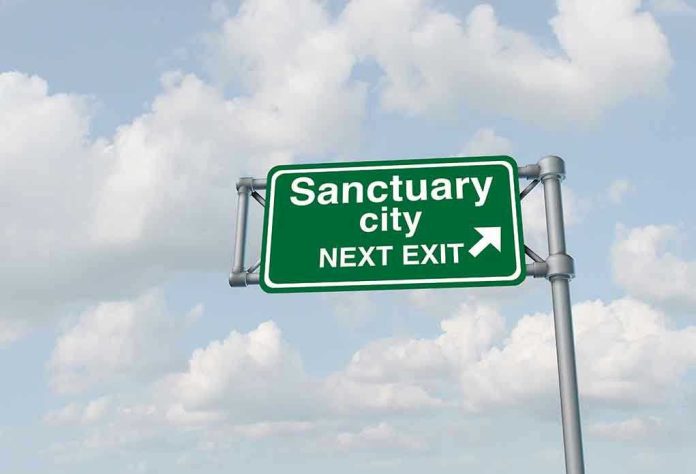
Boston’s sanctuary city policies face a federal crackdown, challenging local governance and immigrant protections.
Story Snapshot
- Boston Mayor Michelle Wu defends sanctuary policies amid federal threats.
- Attorney General Pam Bondi warns of legal action and funding cuts.
- Wu cites Boston’s safety record to justify immigration policies.
- Federal pressure highlights tensions in U.S. immigration enforcement.
Federal Threats to Sanctuary Cities
In a bold move, the U.S. Department of Justice, led by Attorney General Pam Bondi, has intensified its threats against Boston, demanding compliance with federal immigration law. Bondi’s warnings include potential criminal charges and the withdrawal of federal funds. This aggressive stance places Boston at the center of a national debate over local autonomy and federal authority in immigration enforcement.
Mayor Michelle Wu remains unwavering in her defense of Boston’s sanctuary policies. In an August 19 press conference, Wu reiterated her commitment to protecting immigrant communities. She asserted that these policies contribute to Boston being one of the safest major cities, emphasizing community trust and immigrant contributions to the local economy. Wu’s position reflects a broader resistance among sanctuary cities against federal overreach.
Boston’s Sanctuary City Policies
Boston’s sanctuary city policies, rooted in the Trust Act, aim to limit cooperation with federal immigration enforcement to protect undocumented immigrants. These policies have historically fostered trust between immigrant communities and local law enforcement. Despite federal threats, Boston officials argue that these measures support public safety and community cohesion, challenging claims that they undermine federal immigration law.
The ongoing clash with the federal government has heightened tensions between local and national authorities. Boston’s leadership, supported by community advocacy groups, stresses the importance of maintaining local autonomy and prioritizing public safety over federal mandates. This conflict underscores a broader ideological divide in U.S. immigration policy.
Implications for Urban Governance
The federal government’s aggressive stance toward sanctuary cities like Boston could have significant implications for urban governance. In the short term, the threat of losing federal funds creates uncertainty for city programs reliant on federal assistance. In the long term, legal battles may set precedents affecting other sanctuary cities across the nation, potentially altering the landscape of urban policy and immigration enforcement.
Boston Mayor Bizarrely Cites the Revolution in Attacking Bondi—Ignores Violent Reality in Own Backyardhttps://t.co/dLUUKQEbRZ
— RedState (@RedState) August 20, 2025
As the situation unfolds, Mayor Wu and Boston city officials remain steadfast in their commitment to sanctuary policies. The outcome of this federal-local standoff will be closely watched by other cities and states, as well as by immigrant communities across the country. The resolution of this conflict will likely influence future debates on the balance of power between local governance and federal authority.
Sources:
Mayor Michelle Wu defends city’s immigration policies at sanctuary city congressional hearing
Boston sanctuary cities policies: Mayor Michelle Wu
Mayor Michelle Wu’s response to threats from the U.S. Department of Justice







